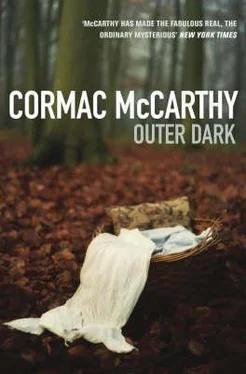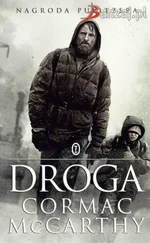Cormac McCarthy - Outer Dark
Здесь есть возможность читать онлайн «Cormac McCarthy - Outer Dark» весь текст электронной книги совершенно бесплатно (целиком полную версию без сокращений). В некоторых случаях можно слушать аудио, скачать через торрент в формате fb2 и присутствует краткое содержание. Год выпуска: 2007, Издательство: Picador USA, Жанр: Современная проза, на английском языке. Описание произведения, (предисловие) а так же отзывы посетителей доступны на портале библиотеки ЛибКат.
- Название:Outer Dark
- Автор:
- Издательство:Picador USA
- Жанр:
- Год:2007
- ISBN:нет данных
- Рейтинг книги:5 / 5. Голосов: 1
-
Избранное:Добавить в избранное
- Отзывы:
-
Ваша оценка:
- 100
- 1
- 2
- 3
- 4
- 5
Outer Dark: краткое содержание, описание и аннотация
Предлагаем к чтению аннотацию, описание, краткое содержание или предисловие (зависит от того, что написал сам автор книги «Outer Dark»). Если вы не нашли необходимую информацию о книге — напишите в комментариях, мы постараемся отыскать её.
Outer Dark — читать онлайн бесплатно полную книгу (весь текст) целиком
Ниже представлен текст книги, разбитый по страницам. Система сохранения места последней прочитанной страницы, позволяет с удобством читать онлайн бесплатно книгу «Outer Dark», без необходимости каждый раз заново искать на чём Вы остановились. Поставьте закладку, и сможете в любой момент перейти на страницу, на которой закончили чтение.
Интервал:
Закладка:
Yes, she said. I got to have him back.
The tinker shrugged his patched jacket higher onto his shoulders and gripped the cart shafts. Well, he said, if you ain’t got nothin else to do just come along with me.
He started off and she fell in behind and padded after him, shoeless and tattered, watching the cart lurch and weave and the tinware hung from the travis poles swing in mounting discord like a demented symphony. They went down the road the way she had come.
They went past houses and along fenced fields where late corn stripped of fodder stood naked and grotesque out of the dead scrub weeds and the intermittent bright shapes of pumpkins. The cart went along on its cam-shaped wheels like a crippled dog. The tinker did not speak. Yellow leaves were falling in a field and lay already deep in the stony troughs a last crude harrowing had left. She walked looking down at her feet and her lips were moving slightly. The sound of the tinker’s cart faded to the drowsy clangor of belled cattle before she looked again and saw him far down the road. She hurried to catch up, holding her dress tight in one fist between her breasts and the cloth already dark with milk.
For the rest of the day she followed behind the cart as if tethered to it. The tinker did not speak nor did he look back and he seemed to have no need of rest. They went through the late afternoon curiously processional and grave among the banded shadows, the tinker stooped in the rotted leather with his cap far back on his head and eyes to the ground and her caught up in the wake of the cart and its lonely tolling tinware like some creature rapt and besorced by witches’ music, demon piping.
Come evening the tinker left the road and turned up a weedy wagon path, giving her a brief look backward and motioning with his head. They climbed up through a field, the cart badly tilted and the tinker near horizontal in the harness. When they came to the top of the hill the track turned and they went on in blue dusk through a high meadow out of which sprang small fowl to wheel away with indignant cries over the sedge. At the end of this meadow was a cabin.
They pulled up in the dooryard and the tinker unbuckled himself from out of his traps and set the cart down. She came along slowly and looked in through the halfopened door. Weeds grew at the threshold and from inside came a musty smell.
They ain’t nobody here, she said.
No, he said. Come in.
She followed him uncertainly into the gloom and stood looking about her. From the naked sash of a window on the far side a dead light fell through looped and dusty skeins of cobwebbing and laid upon the plumbless floor a pale and bent mandala.
Ain’t they nobody here? she said.
No.
What all did we come for?
Come in, he said. Ain’t no need to stand there like a orphan.
She came slowly to the center of the room and stood in the fading patch of light like one seeking warmth of it or grace. A faint stale wind was coming through the window and she turned her face there and breathed deeply. The tinker traversed the room with gnomelike stealth, still bowed in his posture of drayage.
Set down, he said.
She could see no place to sit. She turned and spoke into the gloom after him: He ain’t here.
No, he said. A match flared rich sulphurous light in which the tinker’s malformed shape turned quavering, faded and expired. Not here, he said.
She went to the window and looked out. The ground fell away to a branch where willows burned lime green in the sunset. Dark little birds kept crossing the fields to the west like heralds of some coming dread. Below the branch stood the frame of an outhouse from which the planks had been stripped for firewood and there hung from the ceiling a hornetnest like a gross paper egg.
The tinker returned from the cart with a lantern and placed it upon the mantel and lit it. She watched him. He had a jar of whiskey beneath one arm and he knelt in the floor before the hearth like some sackclothen penitent. He was breaking small brush and sticks and soon there was a flame to which he bowed prone and blew gently upon. He sat back on his heels and coaxed the fire with his wafted cap. You ain’t took root there have ye? he said.
She moved across the empty cabin toward the door and stood there for a moment and then closed it. On the back of it hung a coat cocooned in spiderweb like some enormous prey and on the floor lay a dead bird. She toed it with her naked foot. Spooned to a shell, faintly soursmelling. A small white grub writhed in the damp spot it left. She took down the flower from her hair and held it at her breast and turned. The tinker had the jar of whiskey aloft before the lantern. He unscrewed the lid, paused a moment as if to take breath, and drank. She watched his slack throat pump and his eyes tighten. He lowered the jar again and said Whoof and clapped the lid back on as if something might escape. When he saw her watching he extended the jar in one hand. Drink? he said.
I don’t care for none, she said.
No. He turned and set the jar beside the lantern. His sparse gray hair stood about his head electrically and in all these gestures before the fire he looked like an effigy in rags hung by strings from an indifferent hand. Come over by the fire till ye warm, he said.
I ain’t cold.
The tinker was not looking at her. I expect you’re hungry, he said.
She didn’t answer for a minute. Nor did he turn his head. Yes, she said.
He left the fire and crossed the room and went out. When he came in again he had a small willow hamper over one arm and a load of wood. She had come to the fire and was standing with her back to it. He set the hamper on the floor and stacked the wood.
They used to be a table but I burnt it for firewood oncet of a cool evenin, he said.
She nodded.
Set down, he said. I got some cold supper.
He had squatted on the floor and opened the hamper. She sat carefully with her legs tucked.
Here, he said. Get ye a piece of this cornbread.
She took a chunk of the bread and bit into it. It was hard and sandy and tasteless.
Get ye some of these here beans.
She nodded, her mouth stuffed. He was dipping up beans out of a bowl with a piece of the cornbread. Get all ye want, he said.
Is it far to where he’s at? she said.
Far and far, said the tinker.
She scooped up some beans on her bread and crammed it into her mouth, flicking crumbs from her lap, her streaked and dusty feet tucked beneath her. When do we get there? she said.
The tinker looked at her. We, is it? he said.
I guess we fixin to get a early start of the mornin ain’t we?
It’s a hard thing to know what daylight will bring any day, the tinker said. Get ye some more cornbread there.
I’ve got all I need.
Ain’t much of a big eatin gal are ye?
I’m some out of the habit.
Ah, the tinker said.
You reckon we’ll get there tomorrow sometime?
Tomorrow?
Will we?
The tinker chewed steadily. Over the floor their long flung shadows swayed like dancing cranes. Little sister, he said, you ain’t the first slackbellied doe to go about in the woods with them big eyes.
I just want my chap, she said.
Do ye now?
You said I could work it out.
They’s work and they’s work, the tinker said. He rose to his knees and reached down the whiskey and set it before him.
I’ll do just whatever, she said. I ain’t got nothin else to do.
The tinker smiled and captured the beanbowl between his thin shanks and wiped up the remnants with the last of the bread. He chewed with eyes half closed and his face by the firelight hung in a mask of morbid tranquillity like the faces of the drowned.
You don’t need him, she said.
He wiped his wattled chin with his cuff and took up the jar and drank. He was watching her very steadily above the rim. He set the jar down and recapped it. I’ve gone up and down in this world a right smart, he wheezed, and I’ve seed some curious ways. But I never to this day seen a stout manchild laid out in the woods save one.
Читать дальшеИнтервал:
Закладка:
Похожие книги на «Outer Dark»
Представляем Вашему вниманию похожие книги на «Outer Dark» списком для выбора. Мы отобрали схожую по названию и смыслу литературу в надежде предоставить читателям больше вариантов отыскать новые, интересные, ещё непрочитанные произведения.
Обсуждение, отзывы о книге «Outer Dark» и просто собственные мнения читателей. Оставьте ваши комментарии, напишите, что Вы думаете о произведении, его смысле или главных героях. Укажите что конкретно понравилось, а что нет, и почему Вы так считаете.












